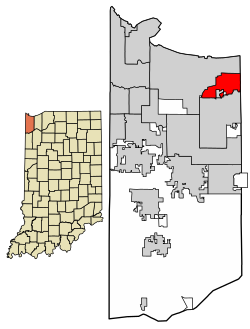2010 census
As of the census [12] of 2010, there were 12,572 people, 4,577 households, and 3,067 families residing in the city. The population density was 1,514.7 inhabitants per square mile (584.8/km2). There were 5,137 housing units at an average density of 618.9 per square mile (239.0/km2). The racial makeup of the city was 79.7% White, 3.6% African American, 0.5% Native American, 0.3% Asian, 11.7% from other races, and 4.1% from two or more races. Hispanic or Latino of any race were 28.0% of the population.
There were 4,577 households, of which 35.6% had children under the age of 18 living with them, 42.4% were married couples living together, 17.1% had a female householder with no husband present, 7.5% had a male householder with no wife present, and 33.0% were non-families. 26.5% of all households were made up of individuals, and 8.3% had someone living alone who was 65 years of age or older. The average household size was 2.72 and the average family size was 3.28.
The median age in the city was 35.4 years. 26.4% of residents were under the age of 18; 9% were between the ages of 18 and 24; 27.2% were from 25 to 44; 26.7% were from 45 to 64; and 10.7% were 65 years of age or older. The gender makeup of the city was 50.0% male and 50.0% female.
2000 census
As of the census [4] of 2000, there were 13,948 people, 5,041 households, and 3,528 families residing in the city. The population density was 1,681.0 inhabitants per square mile (649.0/km2). There were 5,328 housing units at an average density of 642.1 per square mile (247.9/km2). The racial makeup of the city was 86.23% White, 0.77% African American, 0.50% Native American, 0.30% Asian, 0.05% Pacific Islander, 9.31% from other races, and 2.85% from two or more races. Hispanic or Latino of any race were 20.61% of the population.
There were 5,041 households, out of which 33.8% had children under the age of 18 living with them, 48.9% were married couples living together, 14.5% had a female householder with no husband present, and 30.0% were non-families. 23.4% of all households were made up of individuals, and 8.4% had someone living alone who was 65 years of age or older. The average household size was 2.75 and the average family size was 3.24.
In the city, the population was spread out, with 27.1% under the age of 18, 10.5% from 18 to 24, 30.7% from 25 to 44, 21.0% from 45 to 64, and 10.6% who were 65 years of age or older. The median age was 33 years. For every 100 females, there were 99.6 males. For every 100 females age 18 and over, there were 98.4 males.
The median income for a household in the city was $36,984, and the median income for a family was $41,454. Males had a median income of $35,761 versus $22,659 for females. The per capita income for the city was $15,319. About 10.6% of families and 14.6% of the population were below the poverty line, including 21.3% of those under age 18 and 10.0% of those age 65 or over.



